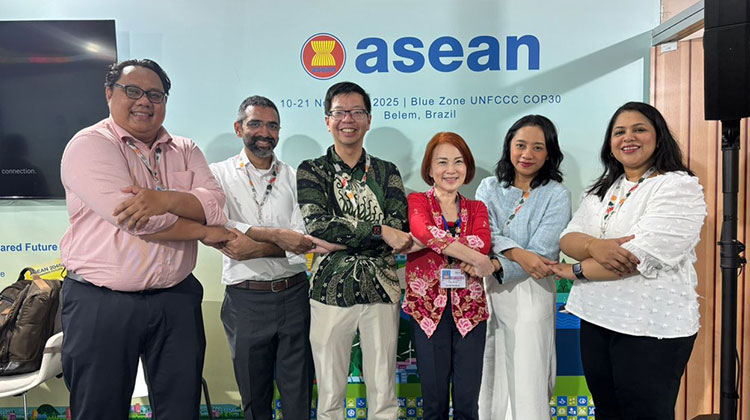
A Year After the Memorandum of Collaboration: ASEAN Common Carbon Framework Reflects on Achievements and Next Steps at COP30
Belém, 13th November – The ASEAN Common Carbon Framework (ACCF) was in the spotlight at the ASEAN Pavilion during UNFCCC COP30 in Belém, Brazil, through a panel session titled “ASEAN Common Carbon Framework: Bridging National Priorities with Regional Goals.” The session, under the Pavilion’s theme “Unlocking Finance for Net Zero,” was co-organised by the Malaysia Carbon Market Association (MCMA), the ASEAN Alliance on Carbon Markets (AACM), and the Singapore Sustainable Finance Association (SSFA).
Moderated by Kavitha Menon, Director of SSFA, the panel featured Dr. Renard Siew (Group Head of Corporate Sustainability at Yinson Holdings; President of MCMA; Chair of the ACCF
Steering Committee), Natalia Rialucky (Founder and CEO of Fairatmos; Deputy Chair for Intra-ASEAN Relations at AACM), and Anshari Rahman (Director, Strategy and Development Group (Policy & Analytics) at GenZero; ACCF Steering Committee Representative for SSFA). While representatives from the Indonesia Carbon Trade Association (IDCTA) and the Thailand Carbon Markets Club (TCMC) were not present at the session, both continue to play an active role in the ACCF’s development and implementation.
Launched at COP29 through a Memorandum of Collaboration, the ACCF is an industry-driven effort to harmonise national priorities with regional climate ambitions and support high-integrity carbon markets across ASEAN. At COP30, the panellists presented a one-year stocktake and outlined priorities for the Framework’s next phase.
“In just one year, the ACCF has moved from concept to a structured work plan,” said Dr. Renard Siew. “Our aim is not to impose a single regime, but to define common principles and practical guardrails that can support each country’s pathway while building a more coherent regional market.”
The ACCF’s progress has also begun to gain formal regional recognition. It was acknowledged in both the Joint Media Statement of the 57th ASEAN Economic Ministers’ Meeting and the ASEAN Joint Statement on Climate Change to COP30, as well as cited by the ASEAN Capital Markets Forum in its Guidance for an ASEAN Voluntary Carbon Market—reflecting ASEAN’s growing recognition of the Framework’s role in advancing high-integrity carbon markets.
The ACCF work plan is organised around three pillars—Supply and Demand, Market Infrastructure, and Strategic Communications and Capacity Building—with policy and regulatory alignment and pilot projects as cross-cutting priorities. The panel highlighted the importance of avoiding market fragmentation, aligning with Article 6 of the Paris Agreement, and designing interoperable infrastructure and safeguards to foster trust among investors, regulators and communities.
Looking ahead, the panel identified these coming priorities for the ACCF:
- Broadening ASEAN participation and deepening engagement with regulators and ASEAN sectoral bodies.
- Moving towards some form of regional acknowledgement or endorsement of ACCF principles, once adequate trust and track record are built.
- Designing pilot transactions or demonstrations to test interoperability and market infrastructure options.
- Ensuring leadership continuity beyond the initial two-year Memorandum of Collaboration timeframe, potentially through rotating roles among member associations.
The panellists concluded that success for the ACCF in the coming years will be measured by clear regional guardrails, real-world interoperability pilots, and stronger investment signals that channel finance into high-integrity projects across ASEAN.

